#also her arc is about people thinking shes a fraud and trying to take advantage of mourning people but its very vague
Photo

A Fey/Ayasato ancestor who traveled to America in the early 20th century and became a traveling spirit medium during the height of spiritualism
#ace attorney oc#tgaa oc#doodle#oc#ace attorney#her name is iori ayasato#shes afraid of ghosts but is still a somewhat powerful medium#also her arc is about people thinking shes a fraud and trying to take advantage of mourning people but its very vague#this is old i kinda want to redraw her and attempt the nuri style once more
188 notes
·
View notes
Text
Anxious and Depressed? Go Figure.
((A quick Trigger Warning at the top here. I am discussing my anxiety and depression here, and I get into some pretty dark territory. While I don’t do it directly, I do bring up self-harm and suicidal thoughts. If this could cause you harm in any way, please scroll on past. You don’t need that, and you don’t deserve that. Thank you.))
So I’m writing a book of horror short stories. It’s going to be relatively small, but I want to complete it, if only to say I have written something book length, and that I’ve published it. It’s fun telling stories I want to tell, and it definitely comes with challenges. I’ve run into challenges I’ve read about in every “how to write gud” book, and there are things I’ve come across that I didn’t expect. They’re fun to analyse, adapt to, and overcome.
Most of them are.
The challenges that aren’t fun to overcome are the ones that I’m faced with every day, no matter what I’m doing. Depression, anxiety, impostor syndrome, and all the twisted little disguises each of them don in order to slip past the guards and attack my inner sanctum. I’ve started to think that someone’s paying the guards off. Maybe there are plants, corruption in the force that’s meant to protect my smooshy, terrified brain.
Anxiety is my greatest foe, and it’s grown so strong in the past few years. Really since watching my stepmother pass away due to breast cancer. It rocked my world so incredibly. She was a force of nature who seemed unconquerable, and something invisible took her away. Less than a year after that, my step sister took her own life, who had brain cancer as a child, and severe diabetes later in her life, along with a host of medical problems that came with both of those conditions. Physically she was such a frail individual. But she held out longer than I think I ever could have in her situation.
Since then, I went through a phase of judging people for freaking out about nothing, to freaking out about nothing myself.
It feeds, and it grows, and evolves the more you let it. Not like a cute thing like a Pokemon, but like... Tetsuo from Akira. That’s quite accurate, the more I think about it. Like, room-spinning terror, harming those around you who you love, lashing out at strangers, a brief period of overconfidence, followed by a complete overload and subsequent breakdown. All of that is followed by an uncertain peace that resembles a rebirth.
Yeah, like that, but... daily. Sometimes that character arc takes a few days to resolve, sometimes a few weeks. But it’s always there. It has good days, and bad weeks. But it is always around.
There are times I can get a bead on it, shed a spotlight on it because I recognise what’s going on. Those moments are occurring more often now. It helps, but it has also unveiled something that makes it even more sinister.
These are the times when I can recognise it when it rears its ugly head, but it still can do what it does. It still can set me vibrating like a chihuahua, and feeling about as small and vulnerable. Have you ever been on a roller coaster, or fallen down the stairs, and for a little while afterwards, you feel weak, and your whole body feels like a live wire, humming with electricity? It’s like that but sometimes for days, and you also have to carry on like nothing’s happening.
And all the while, your brain is telling you all the worst things you can think of:
You’re a burden on the people you love.
You’re lazy, so you’ll never accomplish a thing.
Nobody wants to be around you, they’re just being nice.
You’re incredibly selfish, and it’s hurting the people you care about.
Those evil mantras I can usually shake off, because of the amazing support system I have. The people I love and care about are amazing. My family are so caring and kind. My girlfriend is absolutely the best. She is anathema to so much of my anxiety. She’s that superhero who shows up and knocks the villain into the horizon. She’s Arwen, when the Witch King’s blade is seeking my heart, and her very presence cuts the gloom (And yeah I know it’s Glorfindel in the books, but my girlfriend’s Arwen.)
For me though, my anxiety’s most powerful “Final Form” is Impostor Syndrome. It’s the voice that tells me that nothing is good, that I’ve earned nothing good, that I don’t have the right to enjoy myself, because I’m not good enough. For any of it. I am inferior, I am not worthy, I am a failure, I am a fraud, and it’s only a matter of time before the whole world finds out and they all come for me.
It’s the hardest for me to reason my way out of, because it’s the easiest to make a case for. Believe you me, I can take nearly anything and turn it into a reason why I’m not good enough. Or at least my anxiety can. I’m not talented enough to do that. See? Told you.
But it is the hardest to banish with reason, or reality. With other aspects of my anxiety, I have the people who love me who are living proof that I worry for nothing. Impostor Syndrome takes the people who love me and uses them as a reason why I’m not nearly as good as I think (and that’s already not that good).
You’re a shit writer/animator/artist/person in general. The people who are telling you otherwise are just doing it because they love you. Because they have to. Everyone knows the truth, they’re just not telling you.
I hate it. I hate it so much. It makes me hate myself, and it’s so good at it.
I know it’s diverting my energy and will away. I can watch days go by, my life go by, because I’m stuck worrying about nothing.
But the one that really scares me is raw depression, and I didn’t realise why until relatively recently.
I’ll explain what I mean by “raw depression”. Normally, my depression joins forces with my anxiety, and they team up on me. Depression, when mixed with anxiety manages to get me to give up on fighting, and it uses anxiety as justification for doing so. The two are so alike that it’s hard to recognise when they’re allied against my citadel of brain matter.
Or at least I thought so. It was only a few months ago that I experienced depression without anxiety, and it scared the shit out of me.
Anxiety is horrible, yes. So far I’ve only outlined what it can do when it has the advantage, when it gets the drop on me, or when it musters up enough energy to take on the dreaded Final Form that is impostor syndrome. But I have managed defences against it. There are times when I get a moment of clarity, In those moments, I can recognise it and convert it to a nervous energy that I can use to increase my productivity and focus. Those moments are rare, but they feel like such a victory when I can manage them.
A few months ago, I had a period where my anxiety had seemed to go on vacation. I’m not sure where it went, or why. Maybe it was fed up being converted into productivity, so it went to a seminar on how to be a more wily little bastard. When it left though, I was left with depression in its raw form. I had no idea how it operated on its own, because I had only faced it when it was coupled with my anxiety.
It is cold, unfeeling, uncaring, and it wants to be terminal. I was sapped of any joy at all. All I could think of was how pointless all the things I had done, or would do, were. I’ve always been a pretty fidgety guy. I usually need something to keep my senses occupied, and I can get deafened by silence (thanks to anxiety no doubt). I had never sat, staring at nothing for an hour before. Not sleeping, not reading, not watching Netflix, but staring at the same part of my bookshelf. Inanimate. Lifeless if not for breath and pulse and thoughts that I hope I never entertain again, but know I most likely will.
Depression on its own isn’t crying, because you don’t feel the sadness well up inside you to explode outward. At least mine isn’t. With mine, you don’t feel the sadness, or the pain, you just are them. And all it wants you to do is end the sadness and pain. It shows you opportunities. It’s not an urge, it just kind of points you at things.
“Hey, you know it’s two steps away.”
“Hey, that’d be sudden.”
“See down there? That’s where it ends.”
I’m sorry. I really hate going back there, and I hope that nobody read this far who’s experienced them. Those thoughts look so simple on paper, but when you know what it is your own brain is trying to steer you into. It’s terrifying. It’s that slow, creeping, in-your-bones fear of something final. And it’s you. It’s all you doing that.
As terrible as anxiety is, as nasty as it can be, at least it seems to have self-preservation in mind. At least mine does. Fear of death is a big thing with my brand of anxiety. To me, anxiety is a knife wound. You’re bleeding, and you’re in pain, but the pain lets you know that you’re still alive, and that you can still live if you fight. Depression is devoid of life, or at least it wants to be. It doesn’t care. It doesn’t love. It just acts alive until it gets what it wants.
It scares the shit out of me. I don’t know if I said that before.
I’m in the middle of a bit of a spike of anxiety now. Not working is more than likely the culprit. I’m not a workaholic by any means, but I do like being productive, and if I feel I’m not being productive the anxiety and self-loathing creep in and start to punish me for my inactivity.
I managed to get a hold of it this time though. Got the little bastard. Let’s see it hop around now. I decided I’d throw it out into the light for a bit. Let other people see how nasty, petty, and irrational it is.
The book I’m writing has characters with flaws I’m familiar with in it. I’m writing characters that suffer from anxiety, impostor syndrome, and depression. Sometimes this leads them to do horrible, irreversible things. Other times, they manage to do the right thing, despite their own minds doing their best to sabotage their best efforts. I’m hoping that writing about my anxiety and depression, and how I experience them, I’ll have material for later use, or at least a foundation to draw inspiration from in the future.
I hope that this helps me turn my greatest weakness into something resembling a strength. I don’t presume that it’ll do that for anyone else, but I hope that if any of this felt familiar to you, that you manage to find your own way to do the same.
Hopefully next time I write here, I’ll share some of the writing from my book, and things will be much more positive.
Thank you for reading.
2 notes
·
View notes
Photo


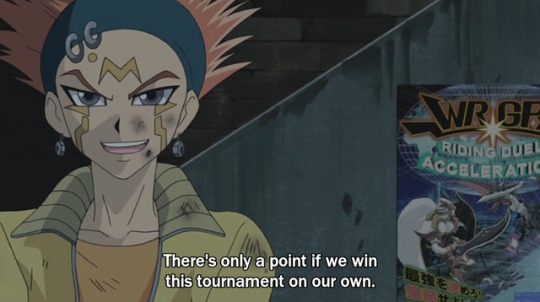


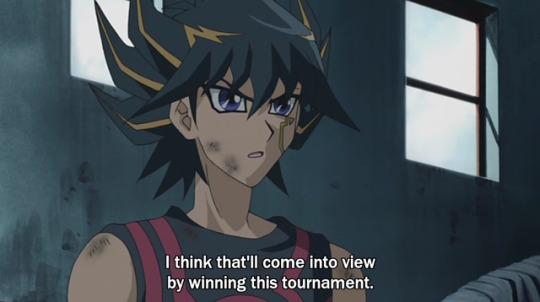
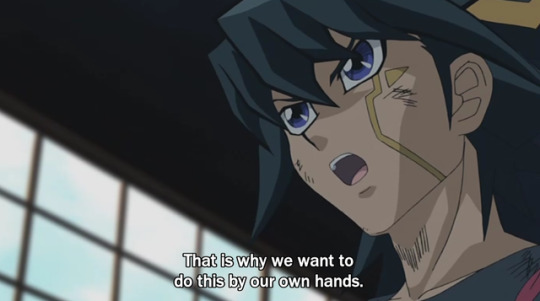
I’ve mentioned this a few times on plurk, but I personally actually like the 3rd season of 5D’s despite it’s weird turn into slice-of-life absurdity while the writers tried to figure their way around the plot rewrites mandated after executive meddling crashed down on them. Scenes like this crop up every now and then during the season which more or less imply that despite Neo Domino City and Satellite reuniting, things aren’t hunky-dory and wonderful like your generic shonen anime would do when rejoining two divided factions. No, there’s still dissent and the city is still not quite reunited despite whatever spiel they want to put about the WRGP being the celebration of the reunited city and the Daedalus Bridge being the symbol of that and etc etc etc. We see that with all these background details-from the three boys’ expenses almost constantly being in the red, to that one episode centered about a young man’s family being hounded by sleazy debt collectors despite them finally being Neo Domino’s citizens, and so on. The earlier filler episodes even have small bits that are intended to drop more plot hooks-Yusei and co go to get an old man out of the reconstruction sites in Satellite, they meet with Saiga at Martha’s and find out about the mysterious falling tablets; Yusei goes to settle issues at Duel Academia, Sly the student who has an unnatural interest in Stardust Dragon is introduced. Some plot hooks are used, some aren’t, but the fact of the matter is that there was some attempt to seed in plot through all the filler works.
That being said, I feel like Season 3 would have been stronger if it was instead set during the 6 month timeskip between the Dark Signer arc and when actual! season 3 begins. Think about it. You have a grungy Satellite that crawled up to become the new King of Riding Duels under dubious circumstances (you can’t tell me people wouldn’t have questioned the validity of a duel that literally happened in a flash of light to everyone else), the former King who was recently revealed to be from Satellite and therefore a fraud, a completely markered up criminal, the Black Rose Witch, and a pair of twins who have largely been isolated from the outside world due to Ruka’s spiritual shenanigans. All of them don’t fit into Neo Domino’s social world at all, all of them are now trying to find their own place to fit in after being brought together by the Signer War, all they have at this point is each other.
Give me Jack fighting for his reputation and his new identity, insisting on carving his own way to be the King while making himself open to the people-all of the people from Satellite and Neo Domino alike, the kind of King Carly wanted him to be. There's resistance of course-he's lost fans, there are people insisting he's a fraud, there are others who hate this new persona of Jack's because he is different and challenges their standards and flawed and human instead of an ideal and a figurehead, but he soldiers on, unrelenting. Give me Aki still struggling with the stigmas that being the Black Rose Witch put on her, trying to fit into a normal life as a senator’s daughter and not quite adjusting because whatever her parents feel now, that doesn’t change the fact that she spent her formative years emotionally and physically apart from them, that doesn’t change that the place she feels validated and loved was at the Arcadia Movement (and now, with her fellow Signers), and it doesn’t change that she sees hostility no matter where she goes. I think it was @stierhai that mentioned this idea of Aki taking over what was left of the Arcadia Movement, or at least working with all the psychics that were displaced by the movement’s collapse, some having been taken in under Security’s care and others roaming free, working with the internal politics and wresting them away from Divine’s influence and making it into what it should have been, a haven for psychics to learn their craft without being stigmatized (and making it her own “place” as a result). Give me the twins deciding to go back to school and make friends their own age, but finding it difficult due to their own reputation during the Fortune Cup and Ruka’s still admittedly weak physical ability, never mind that they’re also friends with the other Signers. Give me Crow reluctantly having to give his kids up to Martha-because with the Daedalus Bridge being built and the B.A.D. area being renovated, he just doesn’t have a place to live anymore and can’t get by thieving like he used to, struggling to make any kind of income because he’s got markers up the wazoo despite all his charges being cleared, having to deal with more stigma than his other friends (because at least Jack has two years of being beloved as the King and a fresh clean face to get by, and Yusei has the current title as King to deflect some hatred) to the point that it’s a wonder he’s able to hold down any job at all until he flat out decides to make his own business with nothing but his D-Wheel and a jacket with a hand-drawn logo on it from his kids.
Give me Yusei, who, despite being the protagonist of the series, actually steps back this arc and becomes more of a background character, a quiet thread of support that keeps all these oddball misfits together. Yusei, who by default is the only thing all the other Signers have in common, bringing them together until they end up as their own interconnected network. Jack and Aki, being used by Iliaster and Arcadia respectively, hunting down evidence of those opposing factions and their ideals and their plans, working together in public to tear down the conspiracies and dealings that built Neo Domino into the faux-utopia it became, with Yusei a quiet moderating force between their easily inflamed personalities. Aki and the twins bonding more as they try to attend the academia together, with Aki trying to help smooth things along for Ruka so she at least doesn’t have the same rocky environment in school that she did in her youth and Rua and Ruka being a supporting, healing place for her to go when school becomes too much (and please, please, let Aki take down Heitmann, she has more investment in this matter than Yusei does and it can help her reputation in the school as well). Crow being the fun big brother for the twins (Yusei is nice, but steady and a little distant, Jack admittedly bonds with Rua and sort of takes him on as an apprentice but he’s still raw and open and figuring out this New King stuff and can be hard to tolerate in large doses, and Aki is a good big sis but also has her own issues) and the twins being a rooting force for Crow-while they clearly don’t need to be taken of the same way his own kids were, they’re also lacking the care and doting affection of a parent that his own kids have, so he’ll take care of them in his own weird big brother way. Yusei, who sits back and helps to facilitate all this happening, because now he knows better than to just shoulder all their burdens himself, knows that it’s better to support and be supported, and while he still has his own doubts and fears about the city’s future and his place in it, he knows with them he can find an answer some day.
Give me the results of this when they go into the WRGP together-still a team that’s not quite in harmony yet, but they’re trying. They lose against Team Unicorn the first round-because even though Yusei tries his damned best, he can’t make up for the mistakes they made and the quick eliminations of Jack and Aki that happened because of it. From this they learn what is needed-how to combine their unique abilites, and when a rematch happens (because this time Team Catastrophe’s failure does not set off Placido’s robo-army just yet, there’s still a chance that the Unicorn-5D’s rematch could result in the Signer’s elimination), it takes full advantage of the fact that the WRGP takes place all over the Daedalus Bridge’s duel lanes, and the fact that it happens with no autopilot.
The rematch happens-and to Team Unicorn’s surprise, Aki is the first wheeler out. She deserves her chance to show her real skills after falling so quickly to Andre, where all she was able to do was pass on Stardust Dragon. A free wheeling chase across the Daimon Area happens-the alleys she knows better than anyone else, the alleys she prowled as the Black Rose Witch, the alleys that once cracked and split open at her call now neatly paved and pristine. Even as she calls out her plants and they bare their fangs, not a single brick is broken out of place, not a single street is damaged, because instead of rampaging and letting out all her sorrow she is determined to follow her new purpose now and show just what a Psychic Duelist can do other than spread fear. She evades all of Andre’s attempts to block her attacks, triumphant.
The Second Wheeler? Crow, who takes off across the Daedalus Bridge’s roads with glee at being able to freely cross the divide between Satellite and Neo Domino, who leaps from Duel Lane to Duel Lane with the wings of the BlackBird, and who can easily power through Breo’s deck destruction with a surefire kill thanks to all the cards that got sent to the graveyard (because if there’s a master of someone using things discarded like trash, it’s someone from the deepest depths of Satellite). Crow, who can finally enter a tournament like the WRGP and show everyone from Neo Domino just what he’s made of, and finally, finally get a reputation beyond the few people who willingly take his house calls, and create his first stepping stone to bigger and greater things.
The Last Wheeler is not Yusei, but Jack, who leads Jean on a drive all around the newly reconstructed Satellite, his knowledge of just where every building is and where reconstruction is still going giving him the edge when it comes to dealing with no autopilot. Jack showboating like usual-driving up buildings, turning backwards, but all being done just to show off how well he knows Satellite, how much of his skills are real without using autopilot, and just how much growing up there has shaped his dueling and who he is today. (Because who knows the deepest depths of Satellite better than the duel gang who took over it all, who roamed every inch of turf and claimed it as theirs, who powered through every single adversary in their path because their strength was absolute!)
Team 5D’s wins, and not because Yusei was the savior who dragged them all to victory, but instead because they bonded together into something stronger, something who could effortlessly tear apart a team who bested them when they were fragmented and still not quite together, because they made the field into something that demonstrated their own strengths, their weaknesses, their pasts, and their dreams for the future.
just. god. give me a season 3 like that. pls. god. if only we could have had this.
#5d's#a '5d's au where post' brought to you by gale#ygo 5d's#yugioh 5ds#gale shitposting#[SLAMS HANDS ON TABLE]#WE COULD HAVE HAD IT AAAAAAAALLLLLL#long post#anyway that wa a long rant
142 notes
·
View notes
Text
Sherlock and the Structure of Shakespearian Plays
While I was watching Hamlet the other day, an idea stuck in my head. Can we apply the structure of Shakespearian dramas to Sherlock? Hell yeah, we can.
Many apologies if there are metas about this exact theme around tumblr (and I’m sure there are some, I just happened not to find them) but I just have to put my thoughts into words. Maybe I can be a conductor of light, too, with my miserable attempt to make sense what’s happened in Sherlock.
So, anyway, enjoy my non-academic rambling about Sherlock, Shakespeare, and drama.
Warning: it’s long!
Dramas are one of the most ancient kind of entertainment. The Greeks developed a so timeless genre of storytelling that it still has effects on today’s theatres, television and movies. Without them, we couldn’t have any of the above in the form that we know now. So, thank you, ancient Greeks for inventing drama! Kudos to you.
Traditionally, drama has two genres - comedy and tragedy. I don’t explain the differences between the two of them because they are pretty obvious for everybody. Shakespeare was the one who changed the structure and meaning of dramas. Originally, dramas contained three acts - beginning, middle and an end. But time goes by, and the structure had to evolve.
There isn’t a fine line in Shakespearian dramas between comedy and tragedy because he had a unique point of view what are the characteristics of the two genres. Usually, the audience found out what kind of drama they were watching by Act 5 because Shakespearian comedies aren’t about laughing (though there are many puns and different types of jokes in both genres). It’s the end which makes difference between Shakespeare’s dramas.
By the end of comedies love conquers all (yup, that was intended right here), the lovers finally can be together, and there is at least one marriage at the final scenes (in A Midsummer’s Night Dream there are four). Happy endings everywhere.
In tragedies, the opposite thing happen, of course. In Act 5, the shit hits the fan (sorry for the vulgarity but it’s true) and everything falls apart. Lovers are lost, families are in pieces, kingdoms are in ruins. No happy endings, just chaos and decay.
Shakespeare invented the Five Act dramas, and applied the structure to his plays. Here is the format of the Five Act drama structure, copied from this website because I’m a lazy ass and don’t want to dig after my old university notebooks.
Act 1: The Exposition
Here, the audience learns the setting (Time/Place), characters are developed, and a conflict is introduced.
Act 2: Rising Action
The action of this act leads the audience to the climax. It is common for complications to arise, or for the protagonist to encounter obstacles.
Act 3: The Climax
This is the turning point of the play. The climax is characterized by the highest amount of suspense.
Act 4: Falling Action
The opposite of Rising Action, in the Falling Action the story is coming to an end, and any unknown details or plot twists are revealed and wrapped up.
Act 5: Denouement or Resolution
This is the final outcome of the drama. Here the authors tone about his or her subject matter is revealed, and sometimes a moral or lesson is learned.
Sounds familiar? We can apply this Five Act structure to Sherlock. We just haven’t seen Act 5 as I stated in this post. And I’m sure I’ve read something very similar from somebody else but I can’t remember what from whom, so I’d be very pleased if somebody could figure out what I was thinking about.
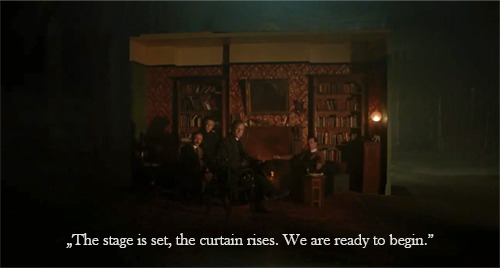
Breaking the fourth wall, huh?
(For some kind of reason this picture reminds me of the drawing room play that was popular in which era? Yup, you guessed right, the Victorian era. But that is a whole new kind of topic.)
Act 1 = Series 1
The Exposition.
The audience learns the setting - 2010, London -, and the characters are developed - Sherlock Holmes, John Watson, Mrs Hudson, Molly Hooper, Mycrot Holmes etc. “A conflict is introduced.” We have very layered conflicts here between the characters, and also we get hints throughout the whole series for the main conflict that Jim Moriarty brings upon the heads of our main characters. It’s beautifully introduced in ASiP:
JW: “What’s Moriarty?”
SH: “I’ve absolutely no idea.”)
and revealed in TGG :
“Jim Moriarty. Hi.”
It’s a well-planned arc to reveal the mystery of Moriarty that works fantastically in S1. The main conflict is introduced for the rest of the play:
“I will burn the heart out of you.”
But Sherlock is informed that he hasn’t got a heart, so Moriarty has to show him that he definitely has one before he burns it out.
Act 2 = Series 2
Rising Action.
Finally, we get to know Moriarty in TGG, and this knowledge arcs through S2. In this Act, Sherlock Holmes and John Watson have to go through many obstacles like The Woman and the Hound. They have to fight with their emotions and develop in character to finally reach the climax of the whole play, The Reichenbach Fall. The conflict (the heart-burning stuff) is fully developed by TRF, and Moriarty makes his first attempt to burn the heart out of Sherlock by ruining his reputation, separating him from the world he knows and the people he cares about. In this series Sherlock learns that he has a heart that can be burnt out of him. We can clearly see how it’s shattering and breaking during the progress of TRF. The first time we can witness is when he confronts John that Moriarty wants the world to believe him as a fraud. But John is still loyal to him even then, and doesn’t believe that Sherlock’s a fake genius. On the rooftop of Bart’s, Sherlock’s heart finally breaks when he calls John to leave a note and I think this is the point he realises that he’s always had a heart. But he doesn’t accept it at this point in the story.
Act 3 = Series 3 + TAB
The Climax.
S3 is the turning point of the whole Five Act play. After 2 years of exile, Sherlock Holmes finally returns to London and reveals to John that he’s not dead. Little did he know that John has got on with his life while he was away and wants to get married. A new important character is introduced, Mary Morstan. She is a new obstacle between our two main characters while they try to mend their friendship. John forgives Sherlock, and Sherlock accepts that John has a life that doesn’t entirely depend on him. They come to terms with this new situation though it’s hurtful for both of them. The cracks are there though they try hard to repair them. Meanwhile, Sherlock’s heart breaks some more beacuse of this new situation. This metaphor becomes more obvious when it turns out that Mary is an assassin and shots Sherlock in the chest. Three times. Once in reality, twice in Sherlock’s Mind Palace. We’re introduced to the structure of MP and the theory of Extended Mind Palace (EMP) on which you can read excellent metas from various writers like @the-7-percent-solution, @inevitably-johnlocked, @gosherlocked and many more. If you’re interested in the idea, go and read something from them.
(Honestly, I like being sceptic and questioning everything but as I’m writing this shitton of rambling, EMP theory starts making more and more sense.)
I add TAB as an extension to S3 because in my opinion it’s more connected to the events of S3 than S4. By the end of it we are back at tarmac hell. Sort of. The whole episode takes place in Sherlock’s head. It’s a play within a play. Sounds familiar? We see this device e.g. in Hamlet.
Hamlet sets up a play in which the actors reenact the murder of Hamlet’s father in order to unveile Claudius’ guiltiness. Sherlock sets up a whole story in which he tries to figure out if Moriarty is dead or alive. We get a clue from Jim (who is a hallucianation within a hallucination) that
“[...] it’s never the fall that kills you, Sherlock. [...] It’s never the fall. It’s the landing.”
And Sherlock, after he comes back (or does he?) from his Mind Palace to reality, gets to the conclusion that
“Moriarty is dead, no question. But more importantly, I know exactly what he's going to do next.”
But in the final scene we are back in 1895, Holmes staring through the window of 221B, and slowly the modern day Baker Street starts to leak through the Victorian setting.
Keep in mind this play within a play device because it’s getting rather fun at this point.
Act 4 = Series 4
Falling Action.
S4 begins lightheartedly but it soon turns pretty dark. It’s a series of consequences and the cracks on the relationships between characters become rifts, everybody’s hearts are broken. The audience feels some things are beyond help, the end is coming and “more unknown details and plot twists are revealed.” Hello, Eurus and Redbeard! And after all the shit Sherlock and John have to go through, they all go back to Baker Street, repair their home and their hearts (it’s such a beautiful metaphor, I’m crying). Finally, Sherlock accepts his heart and learns to live with it.
And they live happily ever after...
Or do they? What is exactly the description of Act 4? “The opposite of Rising Action, in the Falling Action the story is coming to an end, and any unknown details or plot twists are revealed and wrapped up.” Mofftiss created a textbook Act 4 in S4. In the very surface the audience feels it’s really the end, our heroes got their happy endings, and there is also a kind of wrapping up in the plot as we learn details about Sherlock’s past. BUT!
But, by the end of S4 we have more questions than before which suggests it really isn’t the end (I don’t want to start listing the fuckery here because we all know that).
But I have one question that is bigger than every other question.
How did exactly Moriarty burn the heart out of Sherlock? Because I’ve already seen heartbreak, loss and pain, but all these events led Sherlock to learn the advantages of having a heart, and accepting it.
Oh, and have you ever read A Midsummer’s Night Dream? And do you remember Puck suggesting the audience that it all might have been a dream, breaking the fourth wall and questioning reality?
If we shadows have offended,
Think but this, and all is mended,
That you have but slumber'd here
While these visions did appear.
And this weak and idle theme,
No more yielding but a dream,
Gentles, do not reprehend:
if you pardon, we will mend:
And, as I am an honest Puck,
If we have unearned luck
Now to 'scape the serpent's tongue,
We will make amends ere long;
Else the Puck a liar call;
So, good night unto you all.
We, the audience also question the reality of S4, and we have our own Puck... MOFFTISS. They literally tell us they lie and lie and lie and don’t believe a single word they say! So, at least they are honest about lying! Like, are they even real? Those nerds...
Throughout the whole of S4, we get parallels between TAB and S4, and here is a fantastic gifset by @afishlearningpoetry that sums up all the parallels, and gives the feeling that we are all in a well-planned play. The Victorian dream starts to leak into modern days, leading us back to the end of TAB. I think Sherlock didn’t wake up from TAB, and he’s still in his MP, and the different layers he’s built up are leaking into each other.
So, I have a general feeling that S3 and S4 are more tied together than I thought before I started to write this comparison. If I wanted to go further, and why the hell wouldn’t I? I would say we've seen a play within a play within a play in these 4 series. Let me explain.
We have 4 series/4 acts, that’s our “eggshell” play that contains the other plays. Within that “eggshell”, there’s another play, TAB that begins in HLV when Sherlock’s got shot. Within TAB, there’s Series 4. BOOM! Sherlockception.

“You’re too deep, Sherlock.” The water is too deep. It’s time to wake up. Moriarty has finally a heart to burn out.
Act 5 = Series 5
Denounement or Resolution is yet to come.
But will we be watching a tragedy or a comedy? I bet my money on tragedy.
As I was writing this thing I started to think that each series can be considered as 3 Act plays, and I stumbled upon this fantastic meta by @futureofthemasses, explaining all my thoughts and beyond.
Also, there are a lot of foreshadowing throughout S3 and S4 which lead us to the conclusion that Sherlock is a Five Act play. Of course, the writers couldn’t introduce us too soon to the concept because they like keeping secrets but they also like foreshadowing and planning sub-texts into their scripts.
“You are not a puzzle solver, you never have been. You’re a drama queen.” - John Watson, TSoT
“I never could resist a touch of drama.” - Sherlock Holmes, HLV
“The stage is set, the curtain rises. We are ready to begin.” - Sherlock Holmes, TAB
“Pure reason toppled by sheer melodrama. Your life in a nutshell.” - Mycroft Holmes, TAB
“Sorry! I can never resist a gong. Or a touch of the dramatic.” - Sherlock Holmes, TAB
“The perfect stage for a perfect drama.” - Sherlock Holmes, TAB
“The sound of breaking glass - not a window. Just an old theatrical trick.” - Sherlock Holmes, TAB
“The setting is a shade melodramatic, don't you think?” - Sherlock Holmes, TAB
“Nice location for the final act, couldn't have chosen it better myself.” - Sherlock Holmes, TST. And hullo, parallel to the quote above?
“By the pricking of my thumbs” - Sherlock Holmes, TST (quoted from William Shakespeare - Macbeth, Act 4, Scene 2)
“Once more unto the breach...” - Sherlock Holmes, TLD (quoted from William Shakespeare - Henry V, Act 3, Scene I)
+1 The skull fuckery explained by @mrboddydidit, and it has to be Shakespeare. Of course.
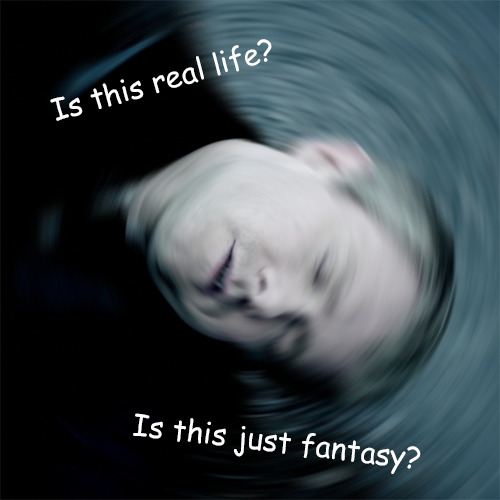
And if you liked this comparison, then...
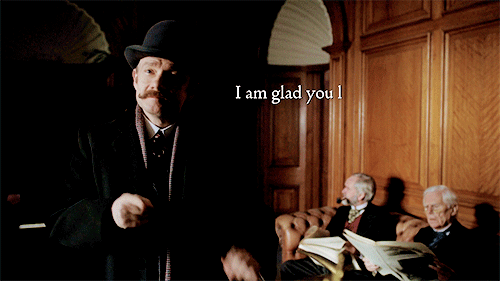
@justwolfiethings @sofini and @holmesianscholar???
idk, don’t take it seriously
Anyway, it was good to get it out of me. I’ll just put this potato out there and wait what will happen...
#bbc sherlock#sherlock#sherlock holmes#tfhc#tinfoil hat club#tinfoil hat#tinfoil deerstalker#sherlock meta#or what is this?#my meta#rambling#just keep on with your scrolling#idk#shakespeare#sherlock and shakespeare#i was bored#we are all anderson#anderson#s4 meta
76 notes
·
View notes